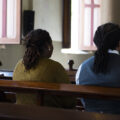Studying Islamic theology in Germany and Austria
Studying Islamic theology in Germany and Austria
Recently, Islamic theology has emerged as a new discipline in Germany and Austria. But is it possible to create an Islamic theology with a European character? And what are the political agendas behind this development?
Over the last decade, new centres and study programmes in Islamic theology have been set up at state universities in German-speaking countries. It was long the case that universities only offered Islamic Studies – the study of Islam from an external perspective. Yet, in Germany, for instance, seven centres for Islamic theology have been established at state universities[1] since 2011.[2] [3]
A parallel development – from university-based Islamic pedagogy of religion to Islamic theology – can be seen in Austria.[4] Initiated by the so-called Islam Law of 2015, the department of Islamic-Theological Studies at the University of Vienna was founded in 2017.[5] [6] In Switzerland, a master programme called ‘Islam and Society’ was also launched at the University of Fribourg in 2019.[7]
The place of Islamic theology in Europe
Given that Muslims are the third-largest religious group in both Germany and Austria,[8] the request of integrating Islamic theologians into the European academic landscape is not nonsensical. An important part of Islamic theology is to examine the cultural, social, and political setting of Islam in today’s European society.[9] It includes the acknowledgement and consideration of the diversity within Islam.[10] [11] For example, the department in Vienna offers, as one of the first in Europe, Alevi (a strain of Islam that is to be found primarily in Turkey) theological studies as a specialisation next to Islamic theology.[12]
Chief among the goals is to introduce Islamic theology as an academic subject within Europe and to form a European tradition of Islamic theology.[13] [14] Prof. Ruggero V. Sanseverino emphasised: “I think one difficulty is to understand that Islamic theology is not the same as Islam […] Theology is, after all, a systematic and scientific reflection.”[15]
Institutions for Islamic theology are installed to create a new generation of Islamic theologians who deal with Islam academically and critically.[16] [17] Historically, Christian faculties of theology, by training clergy and religion teachers for church and school, have strongly contributed to the way in which Christian religion has developed in the larger framework of secular society.[18] The questions are whether and how Islamic theology may transform the wider Muslim community and the conception of its identity in Europe.
Imams made in Europe?
Given the fact that most of those faculties are funded by political authorities, it should not be surprising that this emerging trend aligns with political agendas in terms of integration.[19] Politicians like German Chancellor Angela Merkel have stressed the importance of Islamic theology at universities and its role in training theologians and subsequently imams.[20] [21] [22] Most of the imams in German-speaking countries are trained and socialised abroad, mainly in Turkey. Some of them even receive their paycheck from Turkey.[23] They often speak little German and are unfamiliar with Western European culture.[24] [25] Hence, academic training for future imams at European universities and in the local language is seen as a means of better integration, particularly for young Muslims growing up in those countries.[26]
What is often misunderstood is that universities do not train imams. A degree in Islamic theology could be a good prerequisite, but it is still the responsibility of Islamic associations, just as it is for other religious communities, to train future religious leaders. One of the aims of these new academic departments is that in the long run, Muslim communities will prefer imams who are trained in the local context.[27] [28]
Alongside professional training for scholars in Islamic theology as well as for skilled religious education teachers, these departments give rise to a new generation of pastoral carers, community, and social workers.[29] [30] [31] A 2020 report by the Academy for Islam in Science and Society (AIWG) shows that by shaping Islam in a local context, students of Islamic theology are also trying to shape Muslim communities and society through their acquired knowledge.[32] The majority of graduates – motivated religiously and/or social-politically – are very inspired to get involved in Muslim communities and the wider society.[33]
Prospects and challenges
Expectations from political authorities and students are clearly very high, while the career prospects are rather unclear. Due to financial reasons, many Muslim communities may not offer positions of social or youth workers. In addition, practically, a degree in Islamic Theology does not qualify them for these jobs as well.[34]
Jan Felix Engelhard, director of AIWG, emphasises the significance of cooperation with Muslim communities in this new discipline: “If students hope to engage themselves in Muslim communities through Islamic theology, they should be able to get a taste of community work during their studies and see what kind of fields of work there actually are.” [35] But the cooperation between the academic and religious communities in Austria is already challenged due to conflicts on the sovereignty in interpreting Islam.[36]
It will take some time to see if these obstacles can be overcome. More time is also needed to evaluate whether or not the expectations on the social impact of the discipline and its scholars can be fulfilled. It seems necessary to give this new venture of Islamic theology some time to grow and the European society to integrate the new discipline into its academic and religious environment.[37]
Want to learn more about similar topics? Go to the EARS Dashboard and receive weekly updates.
Sources
[1] In Erlangen-Nürnberg, Frankfurt am Main/Gießen, Münster, Osnabrücke, Tübingen, Paderborn and Berlin. Islamische Theologie – BMBF
[2] Wer studiert Islamische Theologie?
[3] Islamische Theologie – BMBF
[4] : Oddbjørn Leirvik (2016) Islamic university theology, Studia Theologica – Nordic Journal of Theology, 70:2, 127-144, DOI: 10.1080/0039338X.2016.1253258
[5] Department of Islamic-Theological Studies
[6] Islamgesetz 2015 – Bundesrecht konsolidiert, Fassung vom 19.05.2021
[7] Masterhauptprogramm “Islam und Gesellschaft”- 90 ECTS | Schweizerisches Zentrum für Islam und Gesellschaft | Universität Freiburg
[8] After Catholics and Protestants (Germany) respectively Orthodox Christians (Austria) Islamische Theologie – BMBF; Österreich – Religionszugehörigkeit 2020
[9] Islamische Theologie an der Uni Wien
[10] Germany’s first university course for imams opens in Osnabrueck
[11] Department of Islamic-Theological Studies
[12] Discipline of Alevi Theological Studies
[13] Bachelor’s programme in Islamic-Theological Studies
[14] Germany’s first university course for imams opens in Osnabrueck
[15] Islamische Theologie an der Hochschule – Theologen sind keine Muftis
[16] Germany’s first university course for imams opens in Osnabrueck
[17] Department of Islamic-Theological Studies
[18] : Oddbjørn Leirvik (2016) Islamic university theology, Studia Theologica – Nordic Journal of Theology, 70:2, 127-144, DOI: 10.1080/0039338X.2016.1253258
[19] Islamische Theologie an der Uni Wien
[20] Islamische Theologie an der Hochschule – Theologen sind keine Muftis
[21] Germany’s first university course for imams opens in Osnabrueck
[22] Welten des Islam – Islamische Theologie: ein schwieriges und umstrittenes Studium
[23] Berufschancen – Islamische Theologie studiert – und was dann?
[24] Imam-Mangel in Österreich – Leichenwaschen lernt man nicht an der Universität
[25] Islamische Theologie – BMBF
[26] Germany’s first university course for imams opens in Osnabrueck
[27] Humboldt Universität – Umstrittenes Islam-Institut geht an den Start
[28] Imam-Mangel in Österreich – Leichenwaschen lernt man nicht an der Universität
[29] Academic specialisation in Islamic Theology
[30] Wer studiert Islamische Theologie?
[31] Masterhauptprogramm “Islam und Gesellschaft”- 90 ECTS | Schweizerisches Zentrum für Islam und Gesellschaft | Universität Freiburg
[32] Wer studiert Islamische Theologie?
[33] AIWG veröffentlicht Expertise „Wer studiert Islamische Theologie?“ – AIWG – Akademie für Islam in Wissenschaft und Gesellschaft
[34] Berufschancen – Islamische Theologie studiert – und was dann?
[35] Berufschancen – Islamische Theologie studiert – und was dann?
[36] Islaminstitut der Uni Wien rechnet mit IGGÖ ab
[37] Islamische Theologie an der Hochschule – Theologen sind keine Muftis






